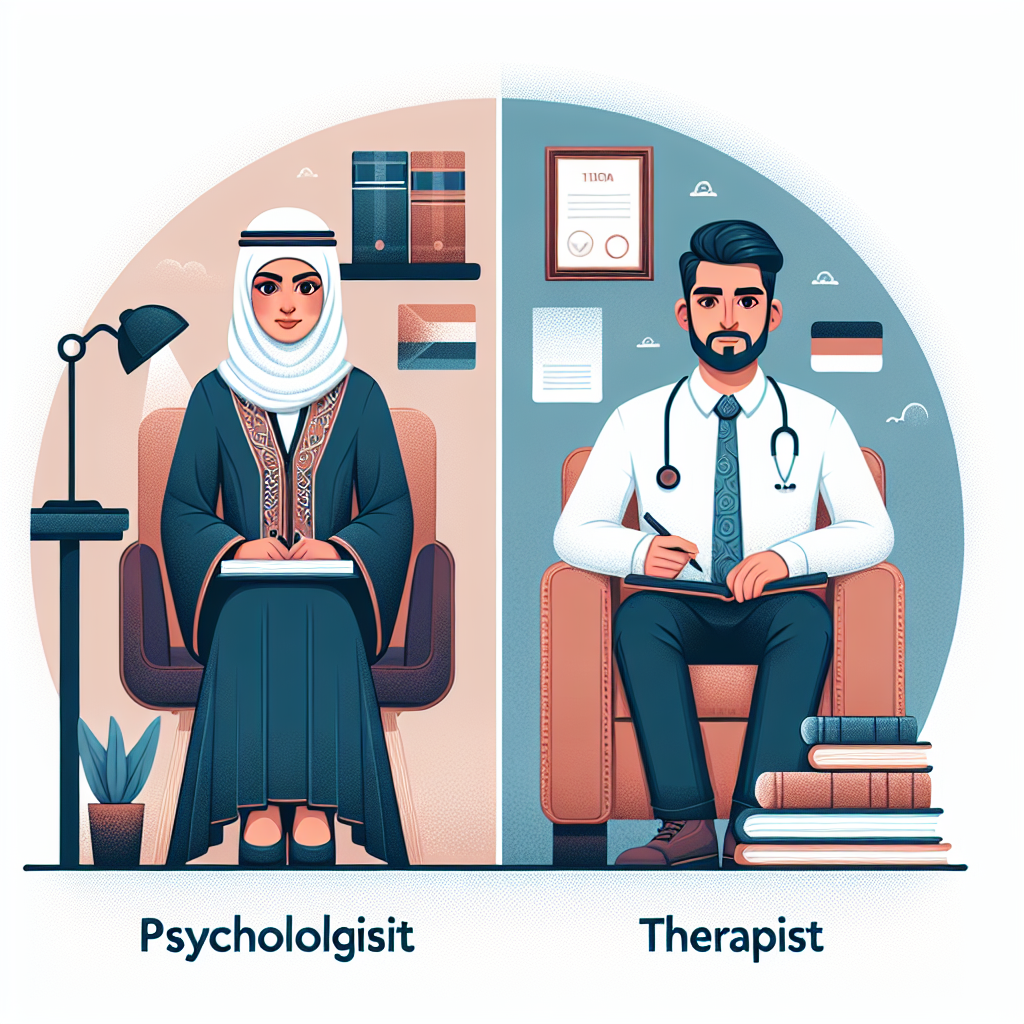Make your appointment now
Relationships can be incredibly rewarding, offering companionship, love, and mutual growth, but they also come with their fair share of challenges that can test the strongest bonds.
Understanding the fundamental differences between psychologists and therapists is essential for choosing the right mental health care provider. Each profession has unique educational paths, licensing requirements, and scopes of practice, all of which influence the type of care they offer.
One of the primary differences between psychologists and therapists lies in their educational paths. Psychologists typically hold a doctoral degree, such as a Ph.D. or Psy.D., which involves extensive study in human behavior, brain function, and psychological research. This rigorous academic training equips them with a deep understanding of complex psychological theories and research methodologies.
In contrast, therapists, including counselors, generally have a master's degree in counseling, social work, or a related field. Their education focuses more on providing therapeutic support and guidance rather than in-depth research. This training prepares them to offer practical strategies and support for clients dealing with everyday emotional challenges.
Further specialization is common in both fields. Psychologists might focus on areas like clinical psychology, neuropsychology, or forensic psychology, whereas therapists might specialize in marriage and family therapy, substance abuse counseling, or child therapy. These specializations further differentiate their roles and the types of issues they are best equipped to address.
Licensing requirements also differ significantly between psychologists and therapists. Psychologists must pass a state and national exam to practice, earning the title of a licensed psychologist. This process ensures that they have the necessary knowledge and skills to diagnose and treat complex mental health conditions.
Therapists, such as Licensed Professional Counselors (LPC) or Licensed Mental Health Counselors (LMHC), also require licensing, which involves passing relevant exams and completing supervised clinical hours. This certification process is designed to verify their competence in providing therapy and counseling services effectively.
Both professions are required to engage in continuing education to maintain their licenses. This ongoing learning ensures they stay updated on the latest developments in mental health care, enabling them to provide the best possible support to their clients.
Psychologists are trained to perform psychological testing, which can be crucial in diagnosing mental health conditions. They might work in clinical settings, providing therapy and conducting research. Their ability to interpret complex data from psychological assessments allows them to develop comprehensive treatment plans tailored to individual needs.
Therapists, on the other hand, focus primarily on providing support through talk therapy. They help individuals navigate emotional challenges and develop coping strategies. While they can diagnose mental health issues, they do not typically conduct psychological testing. Their role is more about facilitating personal growth and helping clients overcome specific life challenges.
The scope of practice for both psychologists and therapists can vary depending on the setting in which they work. For instance, psychologists might be involved in academic research or forensic evaluations, while therapists might work in community health centers or private practice settings.

While therapy and counseling often overlap in practice, they have distinct goals and methods. Understanding these differences can help individuals choose the most appropriate form of support for their needs.
Therapy is generally longer-term and focuses on gaining insight into chronic physical and emotional problems. It can address a wide range of issues from deep-seated trauma to relationship problems. Therapy often involves exploring past experiences to understand current behavior patterns and develop healthier coping mechanisms.
Counseling, on the other hand, is typically short-term and deals with specific issues or life changes. It is more about finding solutions to current problems, like stress management or decision-making. Counseling sessions are usually more structured and goal-oriented, focusing on immediate concerns and practical solutions.
Both approaches can be beneficial, depending on the individual's needs. Therapy might be more suitable for those looking to explore deep-rooted issues, while counseling could be ideal for those seeking guidance on specific challenges.
Therapy can be offered by both psychologists and therapists, but counseling is usually provided by counselors or therapists with a focus on guidance and advice for specific problems. This distinction is important for individuals seeking help, as it affects the type of support they can expect to receive.
Psychologists who provide therapy often do so within the framework of their expertise in psychological testing and diagnosis. They integrate therapeutic techniques with scientific research to offer comprehensive care.
Counselors, on the other hand, are trained to provide support and guidance for specific life challenges. Their approach is often more practical and solution-focused, helping clients navigate everyday issues effectively.
Deciding between therapy and counseling depends on several factors, including the nature and severity of the issues at hand. Individuals dealing with complex emotional problems or seeking a deeper understanding of their mental health might benefit more from therapy.
Conversely, those looking for assistance with specific life challenges, such as career decisions or relationship conflicts, might find counseling more appropriate. Understanding the differences between these approaches can help individuals make informed choices about their mental health care.

Choosing between a therapist and a psychologist depends on your individual needs and the specific challenges you are facing. Both professionals offer valuable support, but their roles and expertise differ significantly.
Consider seeing a psychologist if you need a formal diagnosis or psychological testing. Psychologists are equipped to handle complex mental health conditions, such as severe depression, bipolar disorder, or personality disorders. They combine therapy with scientific research to help manage these conditions.
Psychologists are also skilled in developing comprehensive treatment plans that address the root causes of mental health issues. Their ability to conduct psychological testing allows them to gather detailed information about a client's mental state, leading to more accurate diagnoses and effective interventions.
If you are experiencing symptoms that interfere with daily functioning or have a history of mental health issues, consulting a psychologist might be beneficial. Their expertise in diagnosis and treatment can help you gain a better understanding of your condition and develop strategies to manage it.
If you're facing specific life challenges like grief, relationship issues, or career stress, a therapist might be more appropriate. They provide a space to explore your feelings and develop strategies to cope with life's challenges.
Therapists are trained to offer support and guidance in a non-judgmental environment, helping clients navigate emotional difficulties and make positive changes. Their focus on talk therapy allows individuals to express their thoughts and feelings openly, leading to increased self-awareness and personal growth.
Whether you are dealing with a recent life change or struggling with ongoing stress, a therapist can help you develop effective coping mechanisms and find solutions that work for you. Their practical approach can empower you to overcome obstacles and improve your overall well-being.
Choosing the right professional depends on several factors, including the nature and severity of your mental health concerns. Reflecting on your needs and goals can help you determine whether a psychologist or therapist is the best fit for you.
Consider the types of support you are seeking and the level of expertise required to address your issues. Whether you need a formal diagnosis or are looking for guidance in specific areas of your life, understanding the differences between these professionals can guide you towards the right choice.
Choosing between an LPC and a psychologist involves understanding the differences in their training and expertise, as well as the types of services they offer. Both professionals play important roles in mental health care, but their approaches and areas of focus differ.
An LPC is trained to offer counseling services and typically focuses on helping clients with specific problems through a solution-focused approach. They work in various settings, including schools, private practices, and mental health clinics. Their training emphasizes practical strategies for addressing everyday challenges and promoting personal growth.
Psychologists, on the other hand, have broader training that includes diagnosis and treatment of mental illnesses through both therapy and psychological testing. They often work in hospitals, academic settings, or private practice. Their expertise in psychological assessment and research allows them to offer comprehensive care for complex mental health conditions.
Both LPCs and psychologists are required to engage in continuing education to maintain their licenses. This ongoing learning ensures they remain current with the latest developments in mental health care, enabling them to provide effective support to their clients.
Your choice between an LPC and a psychologist might depend on the nature and severity of your mental health concerns. For minor issues or life coaching, an LPC might be sufficient. Their focus on practical solutions and guidance can be beneficial for individuals seeking support with specific life challenges.
For more severe mental health issues, a psychologist's expertise could be more beneficial. Their ability to conduct psychological testing and develop comprehensive treatment plans makes them well-suited to address complex mental health conditions.
Consider the type of support you are seeking and the level of expertise required to address your needs. Whether you are dealing with everyday stress or more serious mental health concerns, understanding the differences between these professionals can help you make an informed choice.
Reflect on your mental health goals and the type of support you need to achieve them. Whether you are seeking counseling for specific life challenges or require a formal diagnosis and treatment plan, understanding the distinctions between LPCs and psychologists can guide you towards the right choice.
Consulting with potential providers and discussing your concerns can also help you determine the best fit for your needs. By evaluating your options and considering the level of expertise required, you can make an informed decision about your mental health care.
While the terms "counselor" and "therapist" are often used interchangeably, there are important distinctions between these roles. Understanding the similarities and differences can help individuals choose the most appropriate form of support for their needs.
Both counselors and therapists provide valuable mental health support. They use similar therapeutic techniques to help clients process emotions and develop coping skills. Both can work in private practice or within organizations, offering support to individuals, families, and groups.
Counselors and therapists are trained to create a safe and supportive environment where clients can explore their thoughts and feelings. Their shared goal is to help individuals overcome challenges, improve their mental health, and achieve personal growth.
Despite their different titles, both counselors and therapists engage in ongoing professional development to stay updated on the latest developments in mental health care. This commitment to learning ensures they provide effective support to their clients.
While all therapists can provide counseling, not all counselors are therapists. Counselors might focus more on specific issues and provide advice and strategies, whereas therapists often engage in deeper exploration of emotional issues. This distinction affects the type of support clients can expect to receive.
Counselors are typically trained to address specific life challenges, such as career decisions or relationship conflicts. Their approach is more practical and solution-focused, helping clients navigate everyday issues effectively.
Therapists, on the other hand, are often trained to explore deeper emotional issues and provide long-term support. Their focus is on helping clients gain insight into their thoughts and behaviors, leading to increased self-awareness and personal growth.
Counselors typically have a degree in counseling and are required to pass state-specific licensure exams. This certification process ensures they have the necessary skills and knowledge to provide effective support.
Therapists can have a background in various fields, such as social work or psychology, and also need to be licensed. Their training often includes a broader focus on mental health and therapeutic techniques, preparing them to address a wide range of issues.
Both counselors and therapists are required to engage in continuing education to maintain their licenses. This ongoing learning ensures they stay updated on the latest developments in mental health care, enabling them to provide the best possible support to their clients.
This decision hinges on your personal needs and the specific challenges you are facing. Both psychologists and psychotherapists offer valuable support, but their roles and expertise differ significantly.
Severity of Issues: For complex conditions, a psychologist might be necessary. Their expertise in diagnosis and treatment can help you gain a better understanding of your condition and develop strategies to manage it.
Type of Treatment Needed: If psychological testing is required, see a psychologist. Their ability to conduct assessments allows them to gather detailed information about your mental state, leading to more accurate diagnoses and effective interventions.
Preference for Therapy Type: Consider what kind of therapy resonates with you, whether it's cognitive behavioral therapy, talk therapy, etc. Understanding the differences between psychologists and psychotherapists can help you choose the most appropriate form of support for your needs.
Reflect on your mental health goals and the type of support you need to achieve them. Whether you are seeking a formal diagnosis or looking for guidance in specific areas of your life, understanding the distinctions between psychologists and psychotherapists can guide you towards the right choice.
Consulting with potential providers and discussing your concerns can also help you determine the best fit for your needs. By evaluating your options and considering the level of expertise required, you can make an informed decision about your mental health care.
Choosing the right professional can greatly influence your journey towards mental wellness. Reflect on your needs, consider the severity of your issues, and consult with potential providers to find the best fit for your mental health journey. Remember, seeking help is a positive step towards a healthier, happier life.
Understanding the differences between psychologists, therapists, and counselors is crucial for making informed decisions about your mental health care. Whether you're seeking help for a specific issue or need a comprehensive diagnosis, knowing the qualifications and expertise of these professionals will guide you to the right support.
Choosing the right professional can greatly influence your journey towards mental wellness. Reflect on your needs, consider the severity of your issues, and consult with potential providers to find the best fit for your mental health journey. Remember, seeking help is a positive step towards a healthier, happier life.
By taking the time to understand the roles and expertise of different mental health professionals, you can make informed choices that support your mental health goals. Whether you are seeking therapy, counseling, or psychological assessment, knowing the differences between these professionals can help you find the right support for your needs.
As you embark on your mental health journey, remember that seeking help is a sign of strength and self-awareness. By choosing the right professional, you can gain the support and guidance you need to overcome challenges and achieve your personal goals.
Make your appointment now
We take only 5 couples with us
Reserve your spot now!
Over the years, the infatuation often gives way to living side by side as partners. In everyday life with children, a career and different leisure activities, you lose the connection.


Susana and Markus Kessler have been in a happy relationship for more than 25 years. To ensure that their partnership continues to grow, they have repeatedly attended coaching and training sessions on all aspects of their relationship, including communication, money management, and parenting.
A particularly meaningful chapter in their lives was raising two severely traumatized foster children. This journey required extraordinary patience, resilience, and dedication. Through love, understanding, and the knowledge they gained from their own personal development, they were able to provide a nurturing and supportive environment for their foster children to heal and grow. This life-changing experience further deepened their empathy and strengthened their ability to help others facing challenges in their relationships and lives.
They have built up several businesses and have become financially free as a result. They have also attended countless coaching and training sessions for their business on sales, marketing, social media, business development, and investing.
They have been trained coaches since 2015 and are passionate about passing on their knowledge. Their coaching approach is practical, solution-oriented, and individually tailored to the needs of their clients. They offer comprehensive support in the areas of personal development, relationship building and maintenance, financial education, and entrepreneurial growth.
Susana and Markus offer various coaching formats to ensure maximum flexibility for their clients. These include:
With their many years of experience, in-depth knowledge, and the invaluable lessons learned from raising foster children, Susana and Markus Kessler help people to strengthen their relationships and make the most of their lives and opportunities.

Our knowledge comes from 25 years of relationship experience as well as training and further education with the world's best in their field, including the NLP Academy Switzerland, J.T. Foxx, T. Harv Eker, Landmark Wordwide, John Kehoe, Maja Storch and many more.

Every partnership is different. We recognize your individual personalities and work with your own resources to support you perfectly on your path to the perfect partnership.

Anyone who talks about their relationship deserves absolute discretion and an atmosphere of trust. That's why we offer you an empathic environment in which you feel safe and secure and can speak openly with each other.